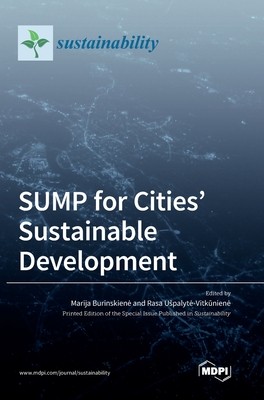
- We will send in 10–14 business days.
- Publisher: MDPI AG
- ISBN-10: 3036504605
- ISBN-13: 9783036504605
- Format: 17 x 24.4 x 1.1 cm, kieti viršeliai
- Language: English
- SAVE -10% with code: EXTRA
SUMP for Cities' Sustainable Development (e-book) (used book) | bookbook.eu
Reviews
Description
In a rapidly changing world, it is necessary to increase the engagement of local authorities and stakeholders to make urban mobility cleaner and more sustainable. The best way is to combine great ideas and innovative measures with political support. This Special Issue consists of six articles analyzing the impact of SUMPs. Innovative measures have been proposed to change urban transport systems towards sustainability: Chinese research has analyzed the tourist flow of Tibet using innovative technologies: mobile phone data, visualizations using GIS, and social networks. Lithuanian authors proposed three autonomous car travel development concepts that should become a conceptual tool in the development of ITS and C-ITS. An English scientific paper is based on a review of local transport policy documents from 13 cities in four countries. Most cities seek to reduce car travel as a proportion of trips. Experience from Slovenia shows that the comprehensive traffic calming approach has positive effects and contributes to achieving sustainable mobility. Korean researchers used the GINI coefficient to evaluate the bus system to identify bus nodes in order of importance. The last article described that multicriteria decision-making methods have been successfully used for assessing the effectiveness of sustainable transport systems, and a universal evaluation model was proposed.
EXTRA 10 % discount with code: EXTRA
The promotion ends in 21d.07:43:12
The discount code is valid when purchasing from 10 €. Discounts do not stack.
- Publisher: MDPI AG
- ISBN-10: 3036504605
- ISBN-13: 9783036504605
- Format: 17 x 24.4 x 1.1 cm, kieti viršeliai
- Language: English English
In a rapidly changing world, it is necessary to increase the engagement of local authorities and stakeholders to make urban mobility cleaner and more sustainable. The best way is to combine great ideas and innovative measures with political support. This Special Issue consists of six articles analyzing the impact of SUMPs. Innovative measures have been proposed to change urban transport systems towards sustainability: Chinese research has analyzed the tourist flow of Tibet using innovative technologies: mobile phone data, visualizations using GIS, and social networks. Lithuanian authors proposed three autonomous car travel development concepts that should become a conceptual tool in the development of ITS and C-ITS. An English scientific paper is based on a review of local transport policy documents from 13 cities in four countries. Most cities seek to reduce car travel as a proportion of trips. Experience from Slovenia shows that the comprehensive traffic calming approach has positive effects and contributes to achieving sustainable mobility. Korean researchers used the GINI coefficient to evaluate the bus system to identify bus nodes in order of importance. The last article described that multicriteria decision-making methods have been successfully used for assessing the effectiveness of sustainable transport systems, and a universal evaluation model was proposed.


Reviews